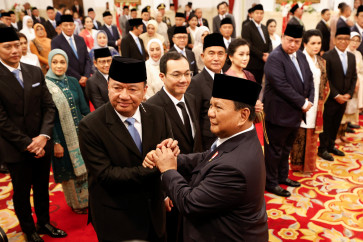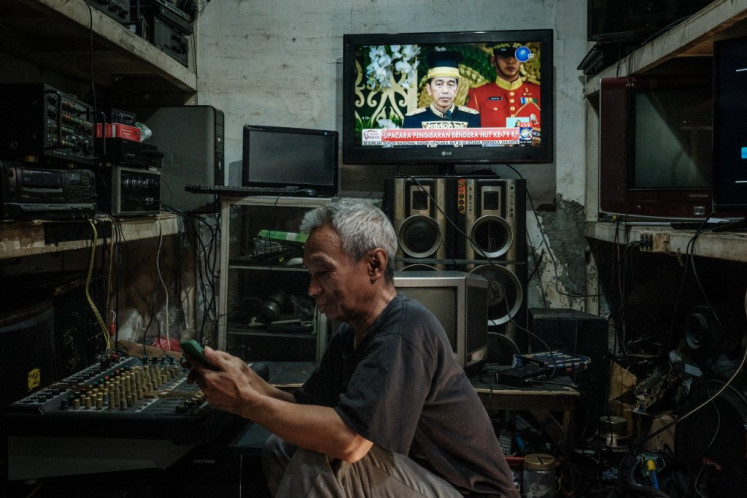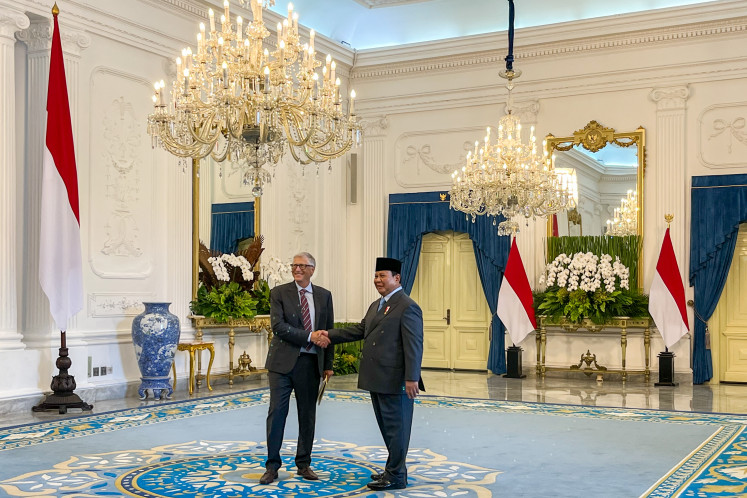TNI, local govt at war with Ambon's addiction to liquor
Doni Monardo - Antara Ambon, the capital of Maluku province, is a city at war with its residentsâ excessive consumption of liquor, a substance some believe to have instigated one of Indonesiaâs most bloody sectarian conflicts which resulted in the deaths of thousands of people
Change text size
Gift Premium Articles
to Anyone

Doni Monardo - Antara
Ambon, the capital of Maluku province, is a city at war with its residents' excessive consumption of liquor, a substance some believe to have instigated one of Indonesia's most bloody sectarian conflicts which resulted in the deaths of thousands of people.
The city's plentiful supply of sopi ' a traditional liquor made out of sugar palm (Arenga pinnata) with an alcohol content exceeding 40 percent ' is currently at the center of a war as the military (TNI) steps in to help limit its distribution.
There are concerns that Ambon will always be at risk of sectarian conflict and pervasive inter-community brawls unless all elements in society are serious about limiting the consumption of sopi, newly appointed Patimura Military Command chief Maj. Gen. Doni Monardo, the former commander of the Army's Kopassus, has said.
'We've realized that sopi is the root of all evil here. The high content of its alcohol has made people extremely aggressive,' Doni told The Jakarta Post on Tuesday.
'A trivial dispute between youths under the influence of sopi can spiral into a brawl with the potential to escalate into a sectarian conflict,' he said.
Between 1999 and 2002, there was a conflict between Muslims and Christians in Ambon and on the nearby island of Halmahera, and residents under the influence of sopi were blamed for triggering and exacerbating the violence. More than 5,000 people were killed during the conflict.
A similar conflict reoccurred in 2011, but the government managed to contain it before it could expand. The brief eruption claimed the lives of seven people.
Ambon Police recently revealed that 80 percent of all crimes in the city of 331,000, comprised equally of Muslims and Christians, were triggered by the consumption of sopi.
Given the scale of the problem, Doni said his personnel would focus on limiting the availability of the raw material for making sopi by encouraging sugar palm growers to turn their produce into brown sugar instead of liquor.
Doni said he would invite banks to provide soft loans for the growers to supply brown sugar to Java.
'By shifting the use of the sugar palm, we expect to reduce the production of sopi. This will eventually increase the price and discourage people from buying it,' said Doni.
'Low-income people can afford sopi because it is available at a very low price,' he said.
A bottle containing 600 milliliters of sopi is sold for about Rp 20,000 (less than US$1.50), far cheaper than a 620-ml can of Bintang beer that can fetch around Rp 50,000 in Ambon.
As brawls among youths were commonplace, occurring nearly every week, Doni said that his command would also help keep the young and unemployed occupied with productive activities that could reduce their desire to consume alcohol.
Ambon mayor Richard Louhenapessy has also pledged a firmer position in the fight against liquor, although he has no plan of banning sopi distribution.
Even though sopi is thought to be a part of the city's tradition, he warned on Wednesday that all civil servants should not consume the liquor during office hours.
'I emphasize to all civil servants that if they are caught drinking during office hours, there will be punishment,' said Richard as quoted by Kompas.com.
'We can't set ourselves as a good example to society if we cannot act like one.'









